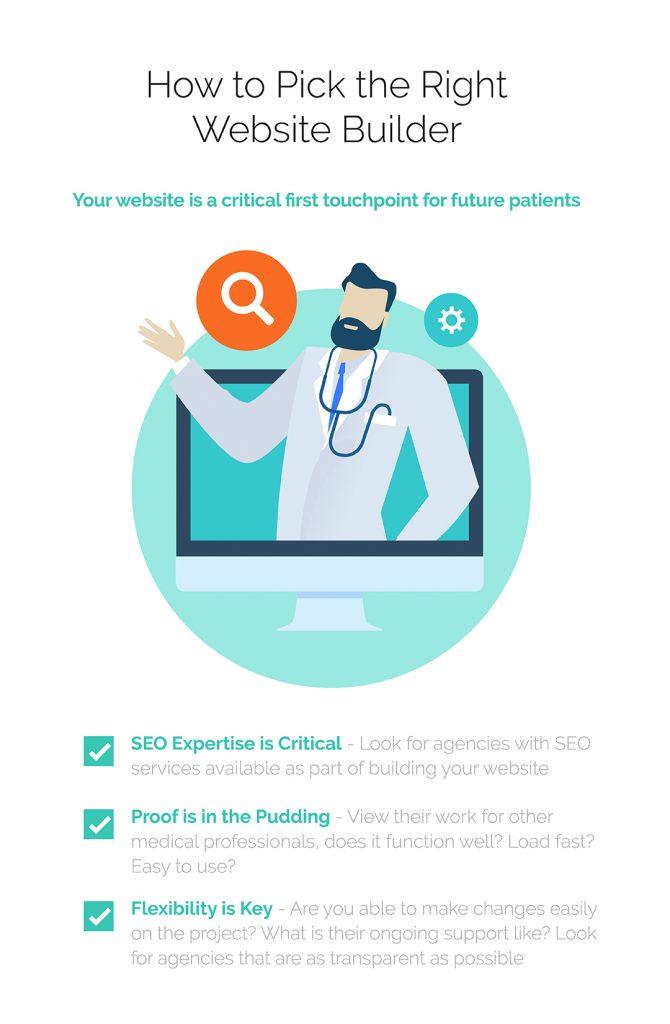Written by Ollie Capel for Doctify
There’s no escaping how crucial digital marketing is for any business, regardless of the sector. The internet provides consumers, clients and patients with the powerful gift of choice. With a heightened awareness of what’s around them, suddenly your patients are acknowledging that their closest medical or dental practice might not actually be the right one for them. We spoke with a top expert, Oliver Capel, in order to create a tool kit for a strong website. Oliver founded Medico Digital, a leading healthcare marketing agency, specialising in website design for consultants, doctors, private clinics and hospitals.
A key element of having an active and secure digital presence is having a good website. Outsourcing the build and management of your website to an external organisation is a great way to save time, allowing you to focus on what’s most important, your patients.

Below are 10 considerations to think about when commissioning your practice website:
1. Examples of Previous Work
Upon first glance, there are a multitude of marketing agencies who have strong portfolios showcasing their previous work and the type of website they could build for you. However, agencies will often differ by industry focus. Here are a few important questions to ask when deciding which agency to work with:
- Do their existing websites function correctly? You can easily check this yourself by looking at the agency’s current clients and using their website as if you were a prospective customer.
Does the website look good on a mobile device as well as your desktop? - Is key information quick and easy to find?
- Does the website load in a reasonable time?
- Do all the buttons work as you’d expect them to?
2. Copywriting
Do they offer copywriting services? The best websites have great content – that’s what users (patients) are there for. Whilst you’re the expert on your subject matter, most doctors/dentists don’t have time during their busy schedules to sit down and write pages of copy for their website, and the majority don’t tend to write in the most patient (and search engine) friendly way.
Good website content is a crucial factor for search engine rankings and being recognised as an authority about a certain subject. There should be plenty of relevant, well written and useful copy on each page. Look for an agency that has a team of copywriters and experience in writing website copy, ideally from a healthcare background to ensure clinical accuracy.
3. Imagery
Imagery sets the tone of your website and helps to reinforce your credibility. Making use of unique, professional photography rather than relying too heavily on stock imagery that’s widely used throughout the web will make your clinic appear trustworthy and relatable. A good agency will be able to support you with this by providing you with connections to photographers, videographers and graphic designers who can create bespoke illustrations for you, helping your clinic stand out from the rest.
4. Sector knowledge
Have they developed healthcare websites before? Ideally, you’ll want to work with an agency who have experience of working with healthcare clients as they’re more likely to have an understanding of your objectives and target audiences.
Knowledge of the healthcare sector will help to navigate the sometimes tricky rules that apply to healthcare marketing. Whether it’s the use of prescription medicine terminology for Google Ads or making sure all your content is factual and verifiable as stipulated by the General Medical Council, it’s good to have an agency that understands the limitations of your digital marketing and can advise ensuring you don’t fall foul of any regulations.
Any agency practicing what they preach will also have a blog of their own, for the reasons mentioned in point #2. This is a clear opportunity to demonstrate sector-specific knowledge and the ability to stay on top of industry trends and developments within the world of healthcare.
5. SEO expertise
A flash website is no good unless you have traffic to view it. Making sure your website adheres to search engine best practices is a must if you want your website to rank in Google’s search results, which will likely be your website’s primary source of traffic. Look for agencies that offer SEO services or ask how they intend to make sure the website gains maximum visibility in search engine listings.
6. Awards, reviews & accreditations
Has the agency won any awards for their design or development work? Do they hold any relevant partner statuses? If the answer is no, what do their clients say about working with them? For an impartial and honest view, check Google for reviews rather than asking for reviews from the agency themselves.
7. Digitally savvy team
Look for agencies with a digitally savvy team. It’s not always easy to identify, but it’s worth checking out the team sections on agency websites to get a sense of the types of people that work there. What are their backgrounds? Each client has different needs and your mileage may vary, but there are considerations to be taken into account even with the makeup of the company. For example, a wide-ranging experience profile may indicate that key personnel have the knowledge to effectively manage complicated campaigns without losing sight of your objectives, whilst retaining the drive and ambition for success that is the hallmark of relative newcomers to the industry.
Ideally, you should be looking for an agency with a mix of digital marketing roles and graphic design expertise. Telltale signs of a digitally savvy team include mention of the specific technologies they like working with or the inclusion of unique tech-focused processes for managing projects. Agencies that shout about these USPs are the agencies that are most likely to be on top of all the latest digital trends and aren’t simply outsourcing their digital projects to third parties.
8. Technology
It’s important to know what framework your website is built on. Ideally, you want your website to be built on a content management system, or CMS for short, to enable you to make changes to content without being reliant on a website developer. There are lots of CMS’s to choose from but try to pick one that’s widely used and supported so you don’t run into problems later down the line when you want to make changes.
WordPress is the most popular CMS with over 60% of the market share and is a great option for most private practice businesses. It’s extremely user-friendly so you don’t need to be an expert web developer to make straightforward content updates, such as changing your secretary’s contact details, should you decide to stop working with an agency.
9. Support packages
Unless you happen to be a technical wiz, you will require some level of support in keeping your website functional and secure over time. Just like a car, websites will need ‘servicing’ every so often when CMS updates happen. Don’t expect your website to look and work the same if you don’t tend to it!
Ask agencies about their website hosting arrangements and what support packages they offer. Look for UK based hosting, processes for obtaining and managing SSL certificates (these keep your website secure) and support options for making changes and dealing with technology updates.
10. Location
Although it’s always beneficial to be able to meet your website developers and discuss your objectives and requirements in person, most website development projects can be managed effectively remotely. This opens the doors to a much wider pool of potential providers, and you’ll find that prices differ massively depending on where you choose to commission your website.
Beware of very cheap foreign providers; although they can seem like great value, you could find yourself spending a lot of time trying to communicate your brief across language and cultural barriers. Inevitably, time zone differences could also come into play and hinder effective communication. That being said, there’s always good value to be had by seeking slightly further afield, particularly if you’re London based, where you’ll be paying the premium for the increased overheads London agencies have to bear.
As you can gather, there are many points to consider when selecting an agency to outsource your website design and maintenance. Remember your website is your clinic’s shop front window and will play a big role in your ability to attract new patients so it’s worth investing some time to do your research and pick an agency that’s right for you.



